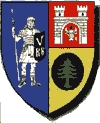Zlatna

Zlatna | |
|---|---|
 | |
 Location in Alba County | |
| Coordinates: 46°09′32″N 23°13′16″E / 46.15889°N 23.22111°E | |
| Country | Romania |
| County | Alba |
| Government | |
| • Mayor (2020–2024) | Silviu Ponoran[1] (PNL) |
| Area | 254.26 km2 (98.17 sq mi) |
| Elevation | 425 m (1,394 ft) |
| Population (2021-12-01)[2] | 6,652 |
| • Density | 26/km2 (68/sq mi) |
| Time zone | EET/EEST (UTC+2/+3) |
| Postal code | 516100 |
| Area code | (+40) 02 58 |
| Vehicle reg. | AB |
| Website | www |
Zlatna (German: Klein-Schlatten, Kleinschlatten, Goldenmarkt; Hungarian: Zalatna; Latin: Ampellum) is a town in Alba County, central Transylvania, Romania. It has a population of 6,652 (2021).
Administration
[edit]The town administers eighteen villages: Botești (Golddorf; Botesbánya), Budeni (Higendorf), Dealu Roatei (Rotberg), Dobrot, Dumbrava, Feneș (Wildendorf; Fenes), Galați (Galz; Ompolygalac), Izvoru Ampoiului (Gross-Ompeil; Nagyompoly), Pârău Gruiului (Gruybach), Pătrângeni (Peters; Ompolykövesd ), Pirita (Pfirth), Podu lui Paul (Pauls), Runc (Goldrücken), Ruși (Rusch), Suseni (Oberdorf), Trâmpoiele (Trempojel; Kénesd), Valea Mică (Kleinwasser) and Vâltori (Waldrücken; Vultur).
Geography
[edit]Zlatna is located 36 km (22 mi) north-west of the county seat, Alba Iulia, on the border with Hunedoara County. Situated in the Zlatna depression, between the Metaliferi Mountains and the Trascău Mountains, the town lies at the confluence of the Ampoi River with Valea Morilor creek.
History
[edit]| Year | Pop. | ±% |
|---|---|---|
| 1977 | 10,027 | — |
| 1992 | 9,391 | −6.3% |
| 2002 | 9,254 | −1.5% |
| 2011 | 7,182 | −22.4% |
| 2021 | 6,652 | −7.4% |
| Source: Census data | ||
A gold mining settlement has existed in the area since Roman times, when it was known as a municipium under the name of Ampellum. The name Zlatna (derived from the Slavic term for gold) was first recorded in a 1347 document. In 1387, it was awarded town status. During 1619-1620 Gabriel Bethlen, brought to Zlatna a few hundred German and Slovak settlers for mining work. Tellurium was first discovered in a Zlatna mine in 1782 by Austrian mineralogist Franz-Joseph Müller von Reichenstein. Zlatna regained its town status in 1968, after a time when it was officially a commune.
At the 2011 census, 89.59% of inhabitants were Romanians, and 4.59% Roma.
Natives
[edit]Climate
[edit]Zlatna has a humid continental climate (Cfb in the Köppen climate classification).
| Climate data for Zlatna | |||||||||||||
|---|---|---|---|---|---|---|---|---|---|---|---|---|---|
| Month | Jan | Feb | Mar | Apr | May | Jun | Jul | Aug | Sep | Oct | Nov | Dec | Year |
| Mean daily maximum °C (°F) | 1 (34) | 3 (37) | 7.3 (45.1) | 13.2 (55.8) | 17.4 (63.3) | 20.7 (69.3) | 22.6 (72.7) | 23 (73) | 18 (64) | 13.1 (55.6) | 7.9 (46.2) | 2.3 (36.1) | 12.5 (54.3) |
| Daily mean °C (°F) | −2.6 (27.3) | −1 (30) | 2.8 (37.0) | 8.2 (46.8) | 12.9 (55.2) | 16.3 (61.3) | 18.2 (64.8) | 18.3 (64.9) | 13.6 (56.5) | 8.7 (47.7) | 3.9 (39.0) | −0.9 (30.4) | 8.2 (46.7) |
| Mean daily minimum °C (°F) | −5.8 (21.6) | −4.7 (23.5) | −1.6 (29.1) | 3 (37) | 7.7 (45.9) | 11.4 (52.5) | 13.2 (55.8) | 13.5 (56.3) | 9.4 (48.9) | 4.7 (40.5) | 0.7 (33.3) | −3.7 (25.3) | 4.0 (39.1) |
| Average precipitation mm (inches) | 45 (1.8) | 43 (1.7) | 56 (2.2) | 72 (2.8) | 83 (3.3) | 96 (3.8) | 88 (3.5) | 67 (2.6) | 64 (2.5) | 54 (2.1) | 46 (1.8) | 53 (2.1) | 767 (30.2) |
| Source: https://en.climate-data.org/europe/romania/alba/zlatna-44399/ | |||||||||||||
Points of interest
[edit]- A 220 metres (720 feet) high chimney, interconnected with a smoke duct with a copper smelter (not in use any more) in the town.
References
[edit]- ^ "Results of the 2020 local elections". Central Electoral Bureau. Retrieved 6 June 2021.
- ^ "Populaţia rezidentă după grupa de vârstă, pe județe și municipii, orașe, comune, la 1 decembrie 2021" (XLS). National Institute of Statistics.
- Downtown Zlatna
- Church of Saint Nicholas and of the Nativity of Virgin Mary
- Church of the Dormition
- Bust of Avram Iancu
![]() Media related to Zlatna at Wikimedia Commons
Media related to Zlatna at Wikimedia Commons






